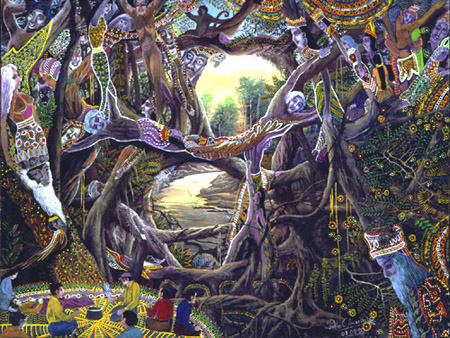 This is the Anthropology of Consciousness Review – Part III.
This is the Anthropology of Consciousness Review – Part III.
Shamanic tourism is gaining popularity every year. This segment of the ecotourism industry serves First Worlders who want to experience entheogens in a somewhat Indigenous context.
Of course, shamanic tourism is really a hybrid between cultures, mediated by a recognized shaman or group leader who is privy to both worlds (as well as a third – the spirit world).
Anthropologist Evgenia Fotiou’s research has focused on Westerners” experience of these contemporary ceremonies. Last year she discussed how most Westerners take part in ayahausca ceremonies with the paradigm of “self-exploration.” This is a much more atomistic approach to ayahuasca than Indigenous groups who cultivate relationships with the spirit world for the pursuit of healing other individuals and communities.
This year at the annual SAC conference Fotiou discussed the role of sorcery in Peruvian ayahuasca ceremonies. Guess what? That shamanic vacation package bought on-line does not insure against dark magic.
Fotiou’s participatory research drawn from dozens of group sessions suggests that, whether or not Western participants are aware of it, their shamanic leader may be in engaged in a sorceric battle with competing shamans. In her words, “Dark forces and light forces are at work.”
Perhaps this is not so surprising as shamans are competing for a limited number of tourists. And sometimes, accusations of sorcery are just as damaging to a local reputation as actually practicing it.
Something to keep in mind next time you are considering a mind-expanding retreat in the wilds of the Andes.
By the way, we”ve started an Anthropology of Consciousness page on Facebook. A great place to find more resources, conversation, and ideas about the role of altered states, mysticism, and entheogens in historic and contemporary societies.
Yes the New Age does not acknowledge black magic but they may find themselves learning about it in an undesirable fashion… either way at least they will learn something lol.
It really surprises me to see all these people reading a few questionable books on shamanism and then running to South and Central America to see traditional shamans when we have so many traditional Native American shamans here in the United States and Canada, especially here in the Pacific Northwest. I am an Etaminua, a traditionally apprenticed Tsinuk Indian shaman, and I often wonder why these South American ???traditional shamans??? make such dubious deals with these ???shamanic vacation tour guides???. I guess the first thing we teach aboriginals is capitalism.
i will like to know where to go for ayahuasca retreat here in the US
i dont think i can go to south america for now
i believe i can fine a retreat in the US.
PLEASE ANY INFO LET ME KNOW
Swadwa, thanks for your perspective. Unchecked capitalism can function like an equal-opportunity cancer, no matter where you live. I also have a feeling that for many Americans, there is so much denial/guilt around their feelings about Native North Americans that it is easier to go south where the projections are not so loaded (but where the same processes of industrial colonialism are still underway….)
And Nathalia, I can’t help you with that, sorry. but check out Swadwa’s link above (http://sasws.net) tho for real traditional shamans who are open to working with individuals or groups in the US.
Well, I would also like to know where to find healers/ceremonies here in the US. I live in L.A. I think one reason that people go to South America is that they are searching for something authentic. I’ve been to some towns in the U.S. where almost everyone claims to be a healer or shaman – so it is hard to know what is real and what isn’t.
Sorry Ronald, I can’t help with that. in general, from what I have gleaned from friends who have studied with curanderos in South America, it’s better to try to find a guide locally (word of mouth) than over the Internet or through any kind of print advertising. the same principle works in the US too – go with word of mouth from people you trust and listen their experiences.